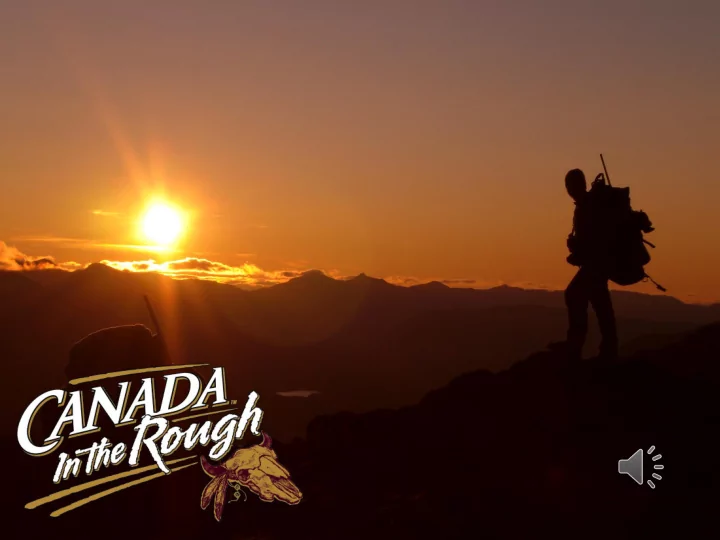

What can social media do for your business? How powerful is it? Good and Bad Social media is free – or is it? What to post What not to post How often to post Scheduling posts Keep content fresh
Take quality pictures Teach your guides Demand that they take time to do it Good photos vs damaging photos Lifestyle and Harvest photos Sunrises, sunsets, candids, wildlife, scenery, fog, insects, birds, skulls, shed antlers, carcasses/bones etc Camp/Cabin and camp life Get pictures from departing clients BEFORE they depart Check clients social media accounts for posts after the hunt that you can share
Encourage clients to post and tag your outfitting page Separate pages for eco-tourism vs hunting Very different interest Require very different marketing efforts A Facebook Page vs a personal account Be careful what goes on your personal account as well Public vs Private posts Do I still need a website?
Why have a website AND social media pages Social Media Connecting with existing and potential customers Keeping current & relevant in their lives Content can be brief and whimsical and must be dynamic
Many client decisions are made based on your website so make it the best you can Photo Galleries Long Term Information Provide answers to all the questions that clients will ask A good website will reduce phone calls or emails Provide Travel Info Specifics Nunavut travel can be different than other destinations Airlines Overnighting in Hotels
Provide weather information Provide Packing List Describe camp and amenities Wifi/Cell Service Describe the hunting experience Transportation Degree of physical difficulty Background on the camp/owners/operators Contact info Links to social media pages
Ensure the client is a good fit for your operation Provide clear and concise information on your website Manage their expectations Weed out problems before they arrive Prevent activists from coming to exploit your business Putting deposits down but not showing up for the hunt
Success Rate Opportunity Rate VS Success Rate # # = # # =
What does the hunter consider a success? Big rack or outdoor adventure?
Accommodations
Food Ask ahead about dietary considerations!
Transportation
Weather Very windy Bugs Provide a packing list on your website!
Summary Odds of Success What hunter considers a success Accommodations Food Weather Packing List You can’t control the weather nor the hunting success but you can control the accommodations and the food so make those great!
SAFETY The only thing a hunter wants more than a big trophy is to come home safely Safe handling of firearms Reliable vehicles GPS Devices Life jackets First Aid Kits No alcohol/drugs while hunting Ability to call for help
Communication Discuss hunting strategy & style Let hunter feel like they are part of the hunt If there are multiple ways to do things then involve the hunter in the decision When you get to a spot, let the hunter know if you are going to sit and glass for 3 mins, or 30 mins or 3 hours Discuss the plan for the day Discussed each morning at breakfast Different clothing requirements for boating vs hiking, sitting on windy hill vs stalking all day Hunters should be informed well enough to know how to dress/pack properly for their hunt each day
Guides that are on-time Guides that will work hard – never quit To feel like your guide knows, understands and keeps all the laws Prior to the hunt, send the hunter a package with a summary of key laws and camp rules Newfoundland has gun/bow case laws that many hunters will not expect…warn them in advance Have some on hand to sell if they don’t have one When they arrive, start each hunt with a sit-down meeting to go over payment, tags, laws and camp rules And then ENFORCE them Remember – Your business will be judged by your Guides
To feel that their outfitter and guides are credible Hunters need to trust that you can find animals Guides need to know the area If you have a new guide, try to send the guide out ahead of the hunters arrival to learn the area Guides need to be able to judge the quality of animals accurately Know the difference between a big caribou or an average one If not sure, error on the smaller side, Don’t lie!
In the event a hunter wounds an animal, where blood can be tracked but the animal does not fall, it is the outfitters responsibility to make every reasonable effort to search for the animal. If the animal is not located after an adequate amount of time has been spent searching, your hunt for that species is considered finished. Make it known upfront Pro’s and Con’s Was it a fatal or non-fatal shot? Use discretion Price to Buy Back In
Hunter tags the target species early and wants to add another species…how to price this ? Up-sell at the beginning of the hunt rather than during the hunt or at the end
Do your research Quality vs Quantity USD vs CAD Hold strong or make deals? Ecotourism vs Hunting Pricing Combo packages What do hunters value? Accommodations Transportation Food Quality of Experience Quality of Animals
Working with booking agents & what to expect Exclusive or Non-Exclusive? How to manage payments Ensure the booking agent is not promising clients something that you won’t deliver
Know and enforce the laws Instruct all hunters at the beginning of the hunt Have them sign a waiver Ensure guides follow laws Make the shipping and exporting process simple and easy for the hunter. Handle their paperwork Line up shippers Straight to their taxidermist Charge a fee
Recommend
More recommend